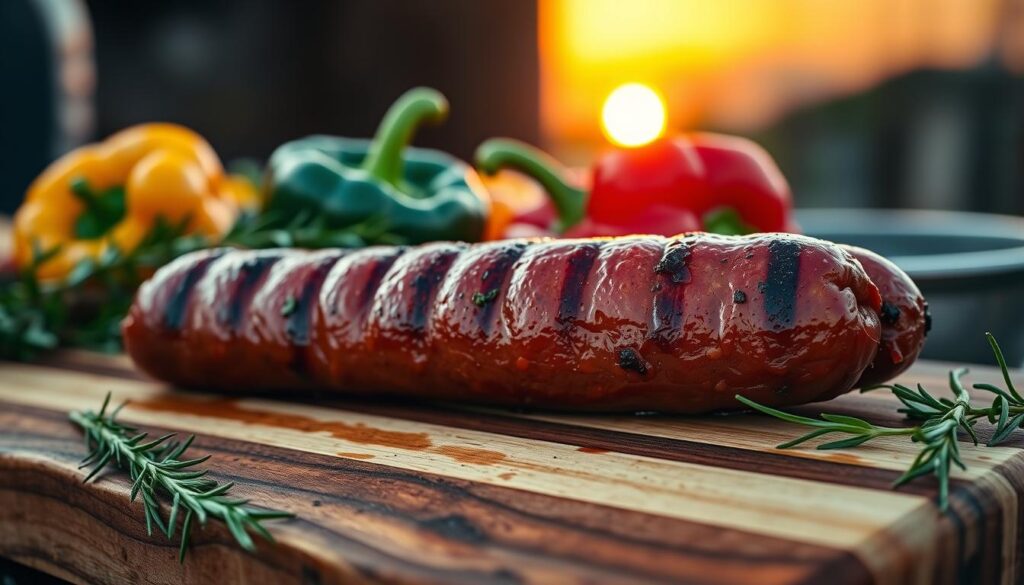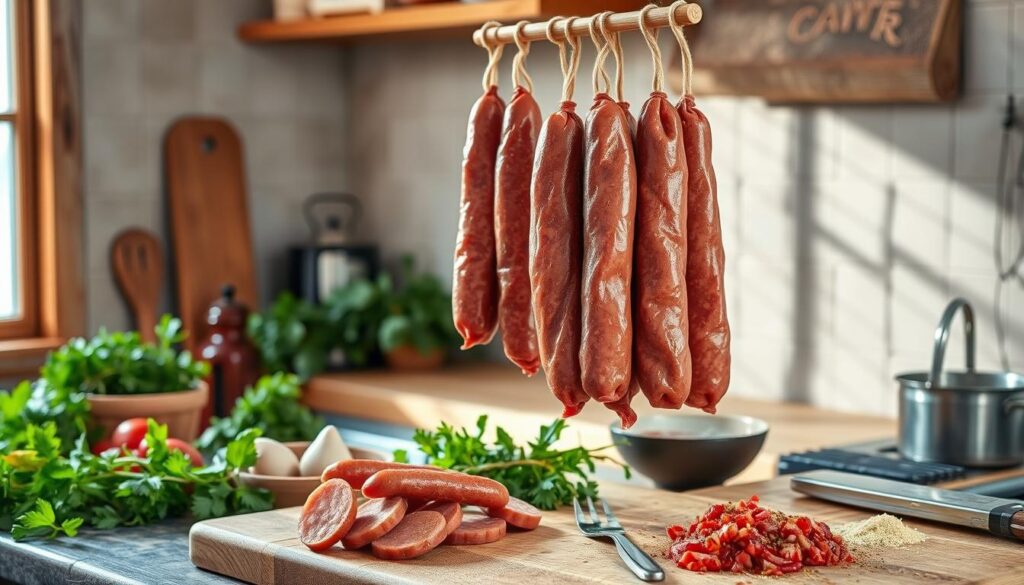Gather your family around the table for a tasty journey with these 3 beef sausage recipes. You’ll find something for everyone, from classic breakfast sausage to Italian-style and quick weeknight meals. Learn how to make homemade sausage and discover the right equipment, meat, and spices for the best flavor.
Table of Contents
Understanding Homemade Beef Sausage Basics
Making your own beef sausage at home is rewarding and tasty. To start, you need to know the basics of sausage making. This includes the right tools, meat cuts, and seasonings. Let’s explore the basics of homemade beef sausage.

Essential Equipment for Sausage Making
Having the right tools is crucial for making sausages. A meat grinder is essential for grinding the beef. Choose a quality model like the LEM Big Bite Meat Grinder #22 for big batches. A sausage stuffer makes filling casings easy. A vacuum sealer helps keep your sausages fresh longer.
Choosing the Right Meat Cuts
The meat is the heart of a great beef sausage. Choose leaner ground beef, like 85/15 or 70/30 fat-to-meat ratio. This balance gives the best flavor and texture. Remember, the ideal ratio is 75:25 or 70:30 for maximum taste and juiciness.
Basic Seasonings and Spice Blends
Seasoning lets you get creative. Start with basics like salt, black pepper, garlic powder, and onion powder. Add smoked paprika, thyme, and sage for depth. Try different spice blends to make unique flavors. Brown sugar, cayenne, or cloves add sweetness and heat.
With the right tools, meat, and seasonings, you’re ready to make tasty homemade beef sausages. Impress your family and friends with your sausage making, beef sausage recipe, and sausage seasoning skills!
Benefits of Making Your Own Beef Sausage
Making your own beef sausage has many advantages. You can choose the ingredients and flavors you like. This way, you avoid preservatives and additives found in store-bought sausages, making it a healthier option.
One big plus is controlling the fat content. You can make sausages leaner, fitting your diet better. Plus, you can try different seasonings and spices to find the perfect taste.
Another benefit is saving money. Buying quality ingredients and making your own sausages can be cheaper. It’s great for big families or those on a tight budget.
Homemade beef sausage brings more than just taste to the table. It lets you connect with your food in a special way. You’ll appreciate the effort and care that goes into making it. It’s good for the environment, supports local farmers, and brings joy to cooking.
Classic Breakfast Beef Sausage Recipe
Start your day with homemade beef breakfast sausage. This recipe combines lean ground beef, aromatic seasonings, and a simple cooking method. It makes flavorful sausage patties or links. Serve them with eggs, biscuits, or breakfast sandwiches for a family favorite.
Seasoning Mix for Breakfast Sausage
The secret to great beef sausage is the spice blend. This recipe has a mix of ingredients for a balanced flavor:
- Kosher salt to enhance the natural beefiness
- Black pepper for a touch of heat
- Onion powder and garlic powder for aromatic depth
- Smoked paprika for a subtle smoky note
- Dried thyme and dried sage to evoke classic breakfast sausage flavors
- Red pepper flakes (optional) for a kick of spice
Shaping and Cooking Methods
Use a lean mix of 85% ground beef and 15% fat for the best texture. Divide the seasoned meat into portions and shape as desired. Cook in a skillet with olive oil over medium heat for 4-5 minutes per side, until the internal temperature reaches 160°F.
Storage Tips
Cooked beef sausage can be stored in an airtight container in the fridge for up to 4 days. Freeze in a single layer on a baking sheet, then transfer to a freezer-safe bag or container for up to 3 months. Reheat frozen sausages in the microwave at 50% power or in a skillet until heated through.
Enjoy your homemade beef breakfast sausage in many ways, from classic breakfast plates to savory sandwiches. For more recipe ideas and cooking tips, subscribe to our newsletter.
Italian-Style Beef Sausage Preparation
Make your dinner special with a tasty Italian sausage recipe made from ground beef. This sausage is great in many dishes, like pasta and sandwiches.
To make the best beef sausage, mix some spices and herbs. Start with garlic, fennel seeds, red pepper flakes, and Italian seasoning. Add this to ground beef, then shape into patties or fill casings.
For the best taste, chill the sausage mix overnight. This lets the spices blend and the meat firm up. You’ll get a juicy, flavorful sausage.
When it’s time to cook, sear the sausage in a pan or grill it until done. Enjoy your Italian sausage in pasta, on pizza, or in a sandwich for a delicious meal.
This easy recipe lets you enjoy Italian sausage without preservatives. Try different seasonings to find your favorite. Every bite will be homemade and delicious.
Beef Sausage Recipes for Easy Weeknight Dinners
Beef sausage makes weeknight meals better. It’s great for quick dishes like one-skillet meals and stir-fries. These recipes are perfect for when you’re short on time but want a tasty dinner.
One-Skillet Sausage and Potato Dish
This dish is easy and tasty. It has beef sausage, potatoes, onions, and bell peppers. It’s quick to make and goes well with a salad for a full meal.
Sausage and Pepper Pasta
Make your pasta night special with this beef sausage recipe. Cook beef sausage with peppers, onions, and tomato sauce. Then, mix it with pasta for a comforting dish everyone will love.
Quick Sausage Stir-Fry
For a light meal, try a beef sausage stir-fry. Cook beef sausage with veggies and your favorite sauce. Serve it over rice or noodles for a fast, tasty meal.
| Dish | Main Ingredients | Cooking Method | Serving Suggestions |
|---|---|---|---|
| One-Skillet Sausage and Potato Dish | Beef sausage, potatoes, onions, bell peppers | One-skillet | Side salad |
| Sausage and Pepper Pasta | Beef sausage, bell peppers, onions, tomato sauce, pasta | Stovetop | Parmesan cheese, garlic bread |
| Quick Sausage Stir-Fry | Beef sausage, mixed vegetables, stir-fry sauce | Stir-fry | Steamed rice or noodles |
These beef sausage recipes are easy and delicious. They’re great for busy nights. With a little effort, you can make a meal that everyone will enjoy.
Smoking and Grilling Techniques for Beef Sausage
Take your homemade beef sausage to the next level with smoking and grilling. These methods add a delicious aroma and a smoky taste. Your family and friends will love it so much, they’ll ask for more.
Smoking Beef Sausage
For a memorable smoked sausage, use wood chips like hickory or applewood. These woods give a strong, classic flavor that goes well with beef sausage. Soak the wood chips in water for 30 minutes before using them in your smoker or grill. This ensures a steady, flavorful smoke.
Smoke the sausages at 225°F to 250°F for 2 to 3 hours, or until they hit 160°F. This slow cooking lets the smoke fully soak into the meat. You’ll get a sausage that tastes amazing.
Grilling Beef Sausage
For a fast and tasty grilled option, heat your grill to medium, about 350°F to 400°F. Place the beef sausages on the grates and cook for 15 to 20 minutes, turning them now and then. Add sliced onions, bell peppers, or other veggies to the grill for extra flavor.
Top your smoked or grilled beef sausage with your favorite sauces, like mustard or barbecue sauce. It’s a meal that’s both satisfying and delicious. Every bite is a mix of savory, smoky, and slightly charred flavors.
“Smoking and grilling are the secrets to unlocking the true potential of homemade beef sausage. The result is a flavor-packed masterpiece that will impress even the most discerning palate.”

Essential Tips for Perfect Beef Sausage Texture
Getting the right texture in your homemade beef sausage is key for a great meal. A few important tips can help you make sure your sausage is just right. It should be moist but firm.
Moisture Content Guidelines
The secret to juicy sausage is the meat-to-fat ratio. Aim for 60-70% lean meat and 30-40% fat. This mix keeps your sausage from being too dry or too greasy.
Don’t overwork the meat. This can make it dense and tough. Handle it gently when preparing.
Temperature Control Methods
Keeping the right temperature is vital when making sausage. Keep everything cold to stop the fat from melting and the meat from getting tough. Chill the meat mix well before stuffing it into casings.
When cooking, make sure the sausage reaches 160°F (71°C) for safety and best texture. Overcooking dries out the sausage, while undercooking is risky. Use a meat thermometer to check the temperature.
By following these tips, you’ll make delicious, perfectly textured beef sausages. They’ll impress everyone at your table.
Common Mistakes to Avoid When Making Beef Sausage
Making your own beef sausage can be very rewarding. But, it’s key to avoid common mistakes. This way, you’ll get tasty, well-textured sausages every time.
One big mistake is overmixing the meat. It’s important to mix well for spice and fat distribution. But, too much mixing can make the sausage tough. Mix just until everything is well combined.
Seasoning is vital for sausage recipes. But, it’s easy to get it wrong. Always taste a small cooked piece before stuffing. This ensures the seasoning is perfect, about 2% by weight.
Another mistake is air pockets when stuffing. These can make the sausage cook unevenly and dry out. Stuff the meat slowly and gently into the casing. This helps avoid air pockets.
Lastly, don’t pierce the casing while cooking. This lets juices out, making the sausage dry. Handle the sausages carefully to avoid this.
By avoiding these mistakes, you’ll make beef sausage that’s juicy and full of flavor. With a bit of practice, you’ll soon be a pro at sausage making.
Storage and Preservation Methods
Keeping your homemade beef sausages fresh is key. Whether you plan to eat them right away or later, these tips will help. They ensure your sausages stay tasty and fresh.
Freezing Guidelines
Uncooked homemade beef sausages can last up to 3 months in the freezer. Wrap them tightly in plastic wrap or freezer bags. Remove as much air as you can to avoid freezer burn. Don’t forget to label them with what’s inside and the date.
When you’re ready to cook, thaw them in the fridge overnight. This slow thaw keeps their texture and taste better.
Vacuum Sealing Tips
Vacuum sealing can make your sausages last even longer. It seals out air, preventing freezer burn. This can extend their shelf life to up to 6 months.
Use high-quality, food-grade vacuum seal bags. Don’t overfill them to keep the seal tight. Label them with the contents and date before freezing.
By using these storage tips, you can enjoy your homemade sausages for months. Always remember to keep food safety in mind. Check reliable sources for the latest on meat handling and storage.

Conclusion
Learning to make homemade beef sausage recipes is exciting. You can make everything from classic breakfast sausages to Italian-style ones. Plus, there are quick dinner options too. With the right techniques and storage, you can enjoy homemade sausages all year.
Whether you like a hearty breakfast sausage or a zesty Italian-style one, this article has you covered. Try different spice blends and cooking methods. You’ll find your favorite homemade beef sausages.
Perfect homemade beef sausage is all about the basics and mastering techniques. Avoiding common mistakes is key. With practice, you’ll make dishes that wow your loved ones. So, start exploring beef sausage recipes and improve your cooking skills.

12 thoughts on “3 Beef Sausage Recipes”